|
Nutritional Needs Change Throughout Life
Traditional Chinese Medicine (TCM) believes the body builds, maintains, protects and repairs healthy tissue throughout life; the balance between these functions changes as we age. Pursuing the goal of life-long wellness requires us to adjust and match our nutritional intake according to our age group. Every food possesses unique properties with specific nutritional value. Some foods are blood builders, others are brain foods, and yet others are muscle foods while the rest may be energy foods. It is in our best interest to have a wide selection and keep rotating our choices for the sake of variety.
To stay healthy, you should eat according to your age and physical needs. A diet that does not provide adequate nutrition to support the physical demands made on it, or is in excess of what the body needs, is harmful and could lead to serious health problems. Eating three meals a day at fixed times, in moderation, and with lots of variety is recommended.
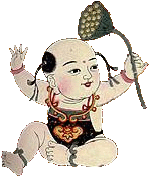 |
| Traditional image of a healthy child. |
Childhood
TCM is concerned about children's diet since their body constitution tends to have the following characteristics:
| |
The spleen and stomach always under-function which makes them vulnerable to digestive problems such as vomiting, diarrhea and parasitic disease. |
| |
|
| |
A child's body is purely yang. Children have a tender and delicate yin-yang balance because their bodies are not yet fully developed. During this time of rapid growth and development, yang qi dominates creating a state of relative yin deficiency. This relative yin deficiency means children can suffer more easily from vomiting or diarrhea leading to loss of body fluids. |
A well-known Chinese idiom says, "If you want your children safe and well, don't let them let them eat too much or be overly warm." TCM holds this as the basic principle for small children's diets. Training in cold resistance (having children better able to tolerate cold temperatures) enhances circulation of the blood and qi (vital energy) and makes the skin and subcutaneous tissues more firm and smooth. The stomach and intestines should not be overly occupied, otherwise undigested food easily turns into evils such as heat evils, phlegm or static fluid, which causes related digestive problems. Proper diet can prevent the onset of disease in addition to promoting growth and development, and is therefore vital during childhood.
A golden rule of the thumb is that all food should be easily digested; fish, lean meats, soups, dairy products, eggs and vegetables are all suitable. The body is developing healthy bones and muscles and requires a diet rich in protein and calcium. Children are highly active and should eat regularly to maintain high energy levels. In contrast, over-consumption of sweet, fried and greasy foods is not advised since these can't be digested properly; instead, TCM believes these foods cause evils such as fire and production of phlegm. Coffee, tea, spicy food and liquors are prohibited.
Adolescence
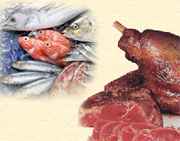 |
| Fish and meat tonify the kidneys and replenish the bone marrow which is important in sexually maturing adolescence. |
Adolescence continues to be a period of active growth and rapid development, especially of the sex organs. According to TCM, during puberty, the kidneys create a substance for promoting sex function, which is called "tian-gui" from the abundance of stored kidney essence. As a result, a male will produce sperm and a female will begin menstruation signaling that the sex organs are mature and capable of reproduction. As the adolescent's body mass increases and the organs mature, the demand for nutrients changes accordingly.
Adolescents should increase their daily intake, especially of fish and meat; these foods tonify the kidneys and replenish the marrow, and help to speed up development. In other words, adolescents require a good quantity and well-balanced diet with lots of calories and nutrients as they develop. Fresh germinating vegetables such as broad bean sprouts, bean sprouts or bamboo shoot are recommended. Spicy or sour foods, and concentrated tea or coffee are not encouraged. These make the internal balance fluctuate which, for example, leads to emotional disturbances.
Adulthood
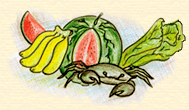 |
| Banana, crab, lettuce and watermelon are cold in energy. |
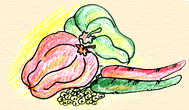 |
| Pepper, chile peppers are hot in energy. |
Growth ceases in this stage. TCM reminds us that in adulthood, we have the strongest constitution in life, and qi and blood are vigorous. The body reaches its optimal balance. For both sexes, daily stress coupled with a busy family life and business demands requires appropriate nutritional replenishment. A varied balanced diet is adequate. Professional people, such as sportsmen or construction workers, should eat more, especially carbohydrates, to maintain energy. It is said the brain can be nourished with a protein-rich diet. People are encouraged to choose food according to their body type. A person with a yang body type should eat more yin (cold or cool) food and vice versa. A person having a yin body type and eating too much cold or cool food will drive the body to a yin extreme. The body's natural defense mechanism will show signs of rejection which western medicine describes as food allergies.
Middle age
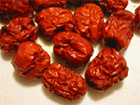 |
| Chinese dates have a tonifying property. |
Suwen (The Book of Plain Questions) states: "Starting from the age of 40, the body's yin qi is only half left, and life activities start to retard." TCM believes that signs of aging appear in middle age. But active measures such as exercise or diet can preserve health, delay the process of aging and reduce the risk of chronic degenerative disease while laying a good foundation for old age.
According to TCM, good nutrition plays a vital role in reducing health risks. A Chinese medicinal diet is recommended for this stage. Herbs of similar, supporting or enhancing natures are added to food to intensify the body's functions. Special therapeutic diets are consumed regularly and frequently to nourish the body. These are designed to assist the body in healing itself; the results are comprehensive and permanent. Some simple therapeutic recipes have become popular family dishes and delicacies in Chinese cuisine. Samples of common anti-aging food are royal jelly, pollen, legumes, mushrooms, white fungus, carp, sesame, walnuts, bamboo shoot and pine nut seeds.
Old age
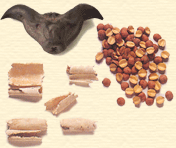 |
| Indian bread, water caltrop and lotus seeds are good for the elderly. |
TCM believes the amount of stored kidney essence will determine how quickly the natural process of aging occurs. The longer a significant amount of kidney essence is stored in the kidneys, the healthier an individual will be. In old age, when the manifestations of aging appear such as stiffness in the joints, bones and tendons, loose teeth and hair loss, this means the organs are under-functioning, and the qi, blood and body fluids are inadequate. This is referred to as deficiency conditions or asthenia syndromes.
Good nutrition becomes a particular challenge during old age. One of the reasons is food and nutritional intake tends to decrease with advancing age because energy demands, appetite, and the sense of smell and taste decline. Secondly, the digestive system becomes less efficient in absorbing nutrients. However, these challenges can be addressed. A medicinal diet to prevent further depletion of kidney essence and regain some degree of primary strength is recommended for the elderly. In old age, it takes longer to see the effects of a tonification diet, and therefore; one needs to be persistent and eat more frequently. The food should be cooked, soft, easily digested and absorbed. Food categories suitable for old age mostly benefit qi, promote blood production, and regulate functioning of the organs. Some commonly used foods are Indian bread, Chinese wolfberry, black soy bean, water caltrop, Chinese dates, peaches, flax seeds, walnuts, grapes and lotus seeds.
Pregnancy & Afterbirth
Diet is a particularly vital factor in the well-being of women, while weather and stress can be major causes of gynaecological problems from a TCM perspective. The menstrual cycle involves a monthly depletion of qi (vital energy) through blood loss, and the food eaten before and during a period should compensate for that. Food eaten during pregnancy directly affects the "congenital jing" (also called congenital essence) which the mother passes on to the foetus; the amount that is provided will last throughout life. Therefore, the mother should ensure that her diet is nutritious, and avoid any extreme energies such as very hot or very cold foods, or spicy dishes which can cause excessive heat. According to TCM, such foods can result in skin problems after birth. As the foetus develops in the womb, the diet should be modified to take into account alterations in the mother's body.
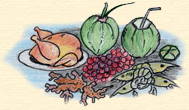 |
| Examples of warming foods to be eaten in the first trimester: chicken, cherry, coconut, ginger and shrimp. |
When a woman conceives, blood circulates in the flush channel where the foetus grows. The woman is in a state of yin blood deficiency and yang qi predominates generally. In the first three months of pregnancy, warming foods should be eaten, and cooling foods introduced in the second trimester to counter the hot conditions prevailing in the uterus. Tonic foods are consumed regularly but should be cut down in the final months before delivery to reduce the risk of a large baby and difficult birth. Chillies, alcohol or frozen foods should be avoided as these can cause miscarriage.
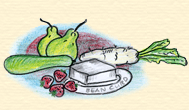 |
| Examples of cooling foods to be eaten in the second trimester: cucumber, bean curd, pear, radish and strawberry. |
One of the most important foods during pregnancy and post-natal care is ginger. A cupful of warm tea, made by adding a few slices of fresh ginger in freshly boiled water, and leaving it to stand until the juices have been thoroughly absorbed into water, is a safe and reliable antidote to morning sickness. Ginger warms the spleen and stomach and is an excellent detoxicant against food poisoning which is why it is always used as an ingredient in dishes. Tangerine peel dries dampness in the spleen and is also used to alleviate problems caused by spleen deficiency. Ginger and tangerine peels counterbalance each other and are commonly used in everyday cooking.
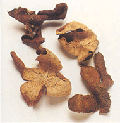 |
| Tangerine peel is a common ingredient in Chinese food because it eliminates dampness. |
Labor causes blood and fluid loss which makes the mother deficient in blood, and yang qi tends to float outward to the body surface. This tends to bring on a cold imbalance and warm food should be consumed. Rebuilding strength after labor is of the utmost importance, and the mother's diet and routine are of crucial importance. One of the customs regarding eating is to tonify the system with ginger stews. These are made with pounds of ginger, peeled and crushed and then covered with special sweet vinegar and simmered for hours until the liquid has reduced and the goodness of the ingredients mingled into a sweet-tasting and delicious gravy. This is then kept as stock and used to stew chicken, duck or perhaps pork, and very often pigs' feet, as a main meal each day. A special chicken soup includes ginger, peanuts, dried jujubes and rice wine.
For new mothers, the spleen and stomach will transform some nutrient essence and, through the flush channel and Yang Ming Large Intestine Meridian, it will promote milk secretion. Making soup with carp promotes milk supply. After boiling carp for an hour, add tofu, ginger and salt to taste. The carp soup resembles milk and is reportedly very effective in improving lactation.
References
| 1. |
北京中醫藥大學主編,中醫基礎理論,學苑出版社,2002年2月。
Beijing University of Chinese Medicine (ed), Basic Theories of Traditional Chinese Medicine, by Academy Press [Xue Yuan], 2002-2 |
| 2. |
倫新、榮莉主編,四季食物補養法,人民衛生出版社,2001年12月。
2. Lun Xin & Rong Li (ed.), Tonifying by Seasonal Chinese Foods, by People's Medical Publishing House, 2001-12. |
| 3. |
沈慶法、于俊生主編,調補與忌口,上海科學技術文獻出版社,2002年8月。
3. Chen Qingfa & Yu Junsheng (ed.), Tonifying effect and Taboo of Chinese Food, by Shanghai Science and Technology Publishing House, 2002-8. |
| 4. |
王坤根總主編,婦女病中醫保健,人民衛生出版社,2000年1月。
4. Wang Kunggen (chief ed.), TCM Health Preservation of Women Diseases, by People's Medical Publishing House, 2000-1. |
| 5. |
方良柱主編,養生益壽食譜,讀者文摘遠東有限公司中文圖書,1997年。
5. Fang Liangzhu (ed.), Food Recipes for Health Preservation and Longer life, by Reader's digest (Far East) Co. Ltd. (1997). |
| 6. |
Sheila McNamara & Dr. Song Xuanke, Traditional Chinese Medicine, by Hamish Hamilton Ltd. c1995 p.120-123. |
| 7. |
漢英中醫辭典,歐明主編,三聯書店(香港)有限公司,1999。
Ou Ming (ed.), Chinese-English Dictionary of TCM, by Joint Publishing (HK) Co., Ltd. c1999. |
| |
|
| Written By: |
| Dang Yi (黨毅) MD PhD |
| Professor, Beijing University of Chinese Medicine; Visiting Professor, Middlesex |
| University, London, UK; Vice Director, Gourmet Food Institute of Health Care and Nutrition of Beijing, PRC. |
| |
| Editors: |
| Angela Collingwood MSN, Integrated Chinese Medicine Holdings Ltd. |
| Raka Dewan, Integrated Chinese Medicine Holdings Ltd. |
| Rose Tse, Integrated Chinese Medicine Holdings Ltd. |
Special thanks to Elpidio Talens Juan for helping with article graphics.
|